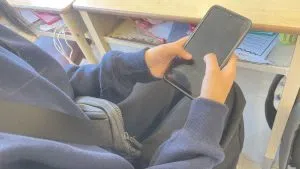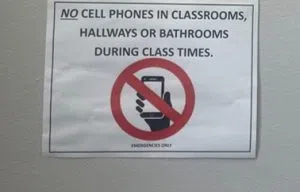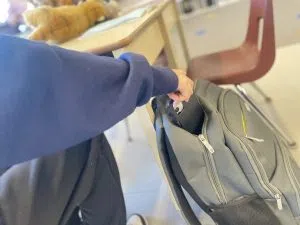
(Student using the cell phone in class. Credi: Roger Farias
The Ontario government has implemented new rules to limit cell phone use in schools, aiming to reduce distractions and boost student focus. While the rule was announced in April, many schools had already started enforcing restrictions. Since its official start in September, teachers have been more consistently enforcing the policy, with stricter measures in place.
Adhara Cediel, a sixth-grade student in London, belives the ban helps students stay focused by reducing distractions in class. “Before the rule comes in, kids used their phones under desks or even while doing homework,” she said. She emphasized that the new regulation encourages concentration and improves school performance, despite some kids feel it is useless. While most younger students follow the rules, she observed that some older students, especially in Grade 8, use phones in hallways or washrooms.

(Sign on the wall. Credit: Roger Farias)
She also highlighted some students feel that educators’ tough enforcement of the ban can influence how they perceive them. “It’s a little intimidating because we don’t have our phones, and teachers assume our behavior—even when we are singing—means we have a cellphone, which isn’t much fun, “she added. “Some kids have been saying it’s annoying that the teachers are so strict about the rule and how it affects how they view them.”
For his part, Matt Bladowski, a parent of an 11th-grade student in London, thinks that while the rule is essential, its implementation is lacking. “As strict, the enforcement of the rules is necessary. But if the schools let it go, there’s going to be a lot of students that just will not succeed in high school the way they have the potential to do, the problem is the execution.”

(Student putting away her phone. Credit: Roger Farias)
This parent has had conversations with teachers about the challenges of this ban and highlighted the difficulties teachers face in maintaining compliance. “Teachers have contacted me to report that my son was using his phone, and I asked them to take it away. However, they told me they aren’t allowed to do so because the students refuse to hand them over. They explained that if the phone were damaged, they would not want to be liable, even though there is a rule requiring students to give their phones to teachers.” He added. “
Bladowski sees the use of cellphones in class as unnecessary and advocates for stronger consequences to create a productive learning environment. “Strict penalties need to be done; the principal need to have the authority to suspend the students, but that’s something that has to be done even though students will say they want to listen to music or need to research during class; it’s all nonsense. They don’t need the cell phone in class.”

(Dr. Wendy Ellis. Credit: King’s University College)
Dr. Wendy Ellis, Associate Professor at King’s University College, stressed the importance of educate students on the impacts of smartphone engagement. “It’s not just about banning devices; it’s also important to provide teachers with guidance on how cell phones are being used and how the rule is being taught”, she said. “Kids need to understand that cell phone companies are designed to engage them. Their business model revolves around attracting users, gathering data, and keeping consumers hooked. The ongoing challenge for teens, their parents, and teachers is finding ways to mitigate this”.
To hear more from these sources, including Meredith McGregor (a mother of two young daughters), Mario Bladowski (an 11th-grade student), and expert Lynda Hutchinson (who researches factors like parental stress, teacher stress, and child-parent conflict as they relate to students’ development), check out our Almost 107 Podcast, available wherever you listen to podcasts or via the following link:




